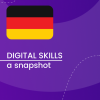Germany - Digital Strategy 2025
The Digital Strategy 2025 programme describes the priorities of the German Government, namely the development of digital capabilities and the promotion of the use of new tools with the aim of enhancing Germany's digitalisation processes. The strategy is based on 10 pillars important for digitalisation, including a pillar that focuses on introducing digital education and throughout the stages of one's life.
The major targets under the Digital education pillar are the following:
- In 2025 every school pupil will have basic knowledge in information science, how algorithms function and in programming. In order to achieve this, appropriate courses must be required in lesson plans in the primary and secondary schools and in teacher education and continued training.
- By 2025, Germany will be one of the leaders in digital infrastructure in the education sector.
- By 2025, the workplace should be the number one place to acquire the newest information technology (IT) knowledge.
- By 2025, all publicly financed educational institutions should make essential teaching material available online. In order to reach these goals, we must push for education in and for the digital world in 2025 at all levels – starting at school, including the dual system of vocational training, on up to university and professional continuing education.
Germany’s Digital Strategy 2025 was adopted in 2016 for 10 year period. The Strategy's actions are intended not only to enable the German economy to respond to new challenges but also to ensure its leading position both in quality and technology for years to come, by combining traditional competitive advantages with the newest technology, modern methods and specific support programmes.
The strategy is coordinated by the Federal Ministry for Economic Affairs and Energy with the active involvement of other public sector organizations, as well as business, Academic sector, scientific community and social partners.
Strategy Details
The strategy's initiatives are financed from the German federal state budget, EU funds, as well as private initiatives and partnerships.
The strategy was adopted in 2016 and is constantly being developed and updated by all parties involved.
In June 2021, Federal Ministry for Economic Affairs and Energy of Germany has published a general status for each implementation step (pending, in planning, in progress, completed) so that everyone can understand the progress of the projects and the achievement of the strategy's goals. 89% of the digital skills endeavors planned in the strategy is already completed or in progress. Only 2% are pending and 9% are already in the planning stage.
German Federal Government want everyone to be able to take advantage of the opportunities offered by digitization. In total, there are 20 projects and 83 implementation steps in the field of digital education.
The federal and state governments are jointly strengthening digital skills at around 43,000 schools in Germany. The federal government enables all schools to have fast internet connections and an efficient digital learning infrastructure. The federal states ensure that teachers are well qualified. All schools should be able to implement digital education.
The strategy also includes initiatives to support universities, companies and adult education institutions in providing digital trainings. For example, by promoting cooperation between training providers, ensuring the availability of the latest technologies and at the same time supporting the professional development of educators at different levels.
The full text of Implementation interim report (2021) is available in German. Executive summary in German is available here.
Ministries involved: Experts from a wide range of disciplines, the various ministries of the federal government and, above all, those who benefit from the individual projects and measures are equally involved. Ministries involved:
- Federal Ministry of Research, Technology and Space (BMFRT)
The Federal Ministry for Economic Affairs and Climate Action (BMWK)
The Federal Ministry for Family Affairs, Senior Citizens, Women and Youth (BMFSFJ)
The Federal Ministry for Economic Cooperation and Development (BMZ)
The ministries are involved and are responsible for activities related to the objectives of their area of competence. More information can be found in the Implementation interim report (2021).





